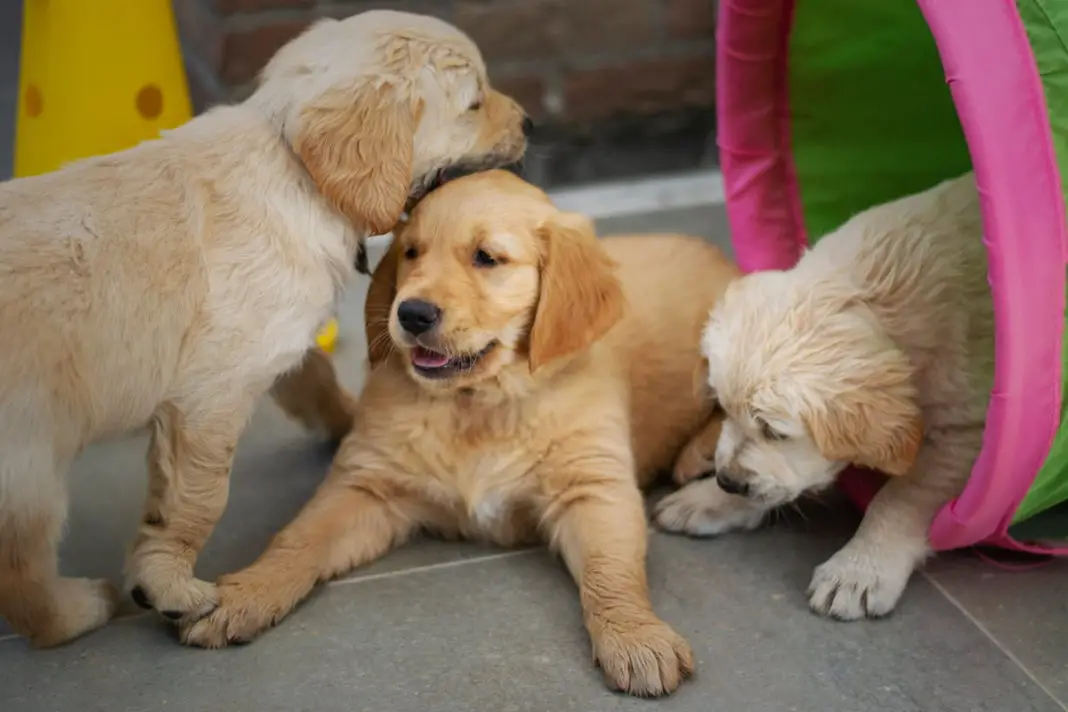Quicklinks:
- Golden Retriever Puppy Hyper At Night?
- What Are The Zoomies?
- Golden Retriever Puppy Hyper After A Bath
- Is It Safe For My Golden Retriever Puppy To Get The Zoomies?
- How Do You Deal With The Zoomies At Night?
Golden Retriever Puppy Hyper At Night?
Just when you think your golden retriever puppy should start settling down for the night, boom, your young pup starts jumping and running around your house like they’re chasing a rabbit. But there’s no obvious explanation for their behavior? There’s nothing in front of them to chase and nothing chasing them from behind. So, what has gotten into your golden retriever puppy? If you’re a new dog owner, then it can be surprising, even alarming, to see your pup acting this way. But don’t fret, as there’s nothing to worry about. Although it may seem like your puppy is hallucinating imaginary playmates, they just have the zoomies.
What Are The Zoomies?
Zoomies, also known as “frapping” comes from the acronym “F.R.A.P.” which stands for “Frenetic Random Activity Period”, which sums up your puppies behavior perfectly! Your retriever pup will show random and intense activity for a short burst of time. Your puppy may run in circles or continue to start and stop on a dime. Another common sign of the zoomies is play bows. This behavior which is completely normal is a way for your pup to get rid of any excess energy.
As “frapping” releases energy, you can expect to see it when your puppy is particularly excited or playful. So, when you think your pup starts to get rowled up, it may be time to get that tennis ball out for a game of fetch and your pup might start zooming all over the backyard. It’ll look like your retriever pup can’t contain their joy.
At times, it can be normal for your puppy to get the zoomies after they’ve experienced a stressful event, like after a bath. It’s as if the pup is discharging any nervous tension that has built up. Or perhaps they’re just delighted that the event is over.
Golden Retriever Puppy Hyper After A Bath
Baths aren’t the only thing that can trigger puppy zoomies. Some pups will also do this after being groomed or after a swim. Your dog could get the zoomies, making them hyper during play. But giving puppies a bath seems to be the most frequent trigger for puppies and older dogs who are prone to zoomies. No one is certain as to why zoomies happens to dogs after a bath or what they mean, but here are a few educated guesses:
Stress relief: Baths are often stressful for young pups. The frenetic movements involved in zoomies could be a natural way for them to relieve stress by releasing pent up energy from their negative feelings about getting a bath.
The new smell: Normally dogs don’t like the new smell, as they put a lot of effort into smelling like their surroundings and probably don’t appreciate having the scents they’ve meticulously collected that has been replaced by the shampoo. It could be that the zoomies are an attempt to escape the perfumed smell, while the pup’s normal behavior of rubbing and rolling around the floor could be an attempt to restore their previous scent.
Drying Off: You’ll probably notice your puppy running around and rubbing up against a bed or sofa. While they could be an act to try and get back to their pre-bath smell, this could also be their natural method of drying themselves.
It’s finally over: It’s also possible that puppies who get the zoomies after getting a bath are simply so overjoyed with bath time being over—or any other trigger activities — that frantic rolling and running around could be the only way for them to release their feelings, fully expressing their joy.
Zoomies also happen quite often at night. Especially with puppies who have been using the crate all day or have not been given enough opportunities to exercise throughout the day, so as soon as they get the chance to run around freely, they’ll take it.
Even adult dogs get the zoomies, although it’s more likely to occur with a younger dog. Why is this behavior so common for pups? Although your golden retriever puppy will nap a lot, they also have huge bursts of activity between nap times. In general, younger puppies are a lot more energetic than older dogs. As your dog ages, like humans, their energy level drops, and the frequency of zoomies typically drops as well.
Is It Safe For My Golden Retriever Puppy To Get The Zoomies?
You could be wondering if the zoomies are safe for your retriever puppy. There are only two concerns you need to consider, which is how often they get the zoomies and any potential obstacles that could cause injury. First, you need to make sure that there are no obstacles in your pup’s path as they zoom around. For example, a fenced yard is a great place for them to get all of that excess energy out rather than doing it in a small, cluttered room. Carpeted areas are safer too, try to make sure your puppy doesn’t wipe out, taking a tumble. It’s also recommended that you move any breakable knickknacks or delicate ornaments away from your puppy’s zooming path. For example, it would be possible for them to bump into the leg of a table leg, making your heirlooms go flying.
Although the zoomies are generally harmless, you should keep an eye on how often your golden retriever puppy is displaying this behaviour. Most of the time, it’s a harmless behavior that puppies appear to wholeheartedly enjoy. But if your puppy is “frapping” all the time, you may need to look out for something more serious. It’s possible for your retriever pup to have an obsessive behavior, which could indicate a bigger problem. Your golden retriever puppy could be dealing with a compulsive need to zoom or may be experiencing a higher than normal amount of stress. If you have any concerns about your puppy’s behavior, you should consult a behavior professional for help and advice.
A more probable explanation for frequent zooming is a sign that your golden retriever puppy isn’t getting the daily exercise they need. Although puppies shouldn’t take part in activities or strenuous exercise like jumping that could affect their growing bones, puppies need physical and mental stimulation. Planning daily walks, playtime, and training sessions can give your puppy a chance for them to release their energy. The more you meet your golden retriever puppy’s mental and physical needs, the less they will need to “frap”.
How Do You Deal With The Zoomies At Night?
The first thing you should consider is setting a routine for your golden retriever pup, which includes time for play, time for training, and time for other activities, whether it’s playing fetch in the yard or taking them for a walk around the block. Make sure to get their much-needed nap time in the routine too. Puppies need a lot of rest that’s spread throughout their day.
And although crates can be an excellent training tool, your puppy shouldn’t be in there from dusk until dawn. If you can’t be home to let your golden retriever pup out for bathroom breaks along with some exercise, consider asking a neighbour or getting a pet sitter to give your puppy some company and activity during the middle of the day. Then when your puppy goes wild at night, you can feel assured and relaxed and enjoy the show, knowing that there’s nothing that you need to worry about.








